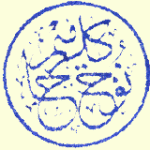-
Ibn Taymiya and Ibn Kathir
© Nuh Ha Mim Keller 1995
Question 1
Ibn Taymiyya and Ibn Kathir
Was Ibn Kathir considered to be part of Ahl al-Sunna by the orthodox community even though he was a student of Ibn Taymiya?
Was Ibn Kathir’s Islamic faith (‘aqida) actually different than Ibn Taymiya’s? If so, on what points? (I will need references.) I know he differed on many fiqh issues, but that is because Ibn Kathir was a Shafi‘i scholar, one such difference being the Mawlid. Ibn Kathir’s tafsir (Qur’anic exegesis) is widely regarded as one of the great works of tafsir, but doesn’t it contain anthropormorphic assertions about the attributes of Allah Most High? If so, how can we reconcile that with the Ash‘ari and Maturidi positions?
Answer
Ibn Kathir (d. 774/1373) is a scholar of Ahl al-Sunna who was of the Shafi‘i school (according to the first volume of his main work, Tafsir al-Qur’an al-‘Azim, 1.2), while Ibn Taymiya (d. 728/1328) was a scholar whose fiqh remained in the general framework of the Hanbali school. Ibn Taymiya’s controversies in tenets of faith (‘aqida) and literalist interpretations of the attributes of Allah were mostly adopted from what had historically been the more anthropomorphic end of the previous spectrum of Hanbali ‘aqida—Hanbali in that some of the followers of this school had these beliefs, not that Ahmad ibn Hanbal in any way supported them or that they were part of his madhhab. They have been resurrected in our times as Salafism or “return to early Islam” by moneyed supporters of the Wahhabi sect, whose differences with Ahl al-Sunna consist almost entirely of the ideas of Ibn Taymiya. In scholarship, Ibn Kathir was a hadith master (hafiz, someone with at least 100,000 hadiths by memory), while Ibn Taymiya was not: his name does not appear in any of the works of tabaqat al-huffaz or “successive generations of hadith masters,” that comprehensively document such scholars. Whatever length of time Ibn Kathir studied with Ibn Taymiya, he was in his twenties when the latter died, and his long and fruitful career extended over the next forty-six years.Alhough I have not read all of Ibn Kathir’s Qur’anic exegesis (tafsir), I have not found in it any traces of Ibn Taymiya’s more unusual positions, the most significant of which, for ‘aqida and Qur’anic exegesis, is his claim that “there is no figurative expression (majaz) in the Qur’an” (Ibn Taymiya:al-Iman, 83), even in the use of such words as ‘hand’, ‘face’, ‘eyes’, ‘shin’, and the like with reference to Allah. He says, “Every word in the Book of Allah and His messenger is conditioned by that which clarifies its meaning, in none of which is there any figurative expression (majaz); rather, all of it is literal (haqiqa)” (ibid., 78). Compare this with what Ibn Kathir says about the verse “Then He ‘was established’ (istawa) upon the Throne” (Qur’an 7:54), (istawa here rendered as “was established” not by way of definitive interpretation, but rather out of need to answer the question):
People have many positions on this matter, and this is not the place to present them at length. On this point, we follow the position of the early Muslims (salaf)—Malik, Awza‘i, Thawri, Layth ibn Sa‘d, Shafi‘i, Ahmad, Ishaq ibn Rahawayh, as well as others among the Imams of the Muslims, ancient and modern—namely, to let the verse pass as it has come, without saying how it is meant (bi la takyif), without any resemblance to created things (wa la tashbih), and without nullifying it (wa la ta‘til): the literal outward meaning (dhahir) that comes to the minds of anthropomorphists (al-mushabbihin) is negated of Allah [italics mine], for nothing created has any resemblance to Him: “There is nothing whatsoever like unto Him, and He is the All-hearing, the All-seeing” (Qur’an 42:11) (Ibn Kathir: Tafsir al-Qur’an al-‘Azim, 2.220).
This is precisely the position of tafwid or “consigning the knowledge of what is really meant by such scriptural expressions to Allah” that Ash‘aris like Imam Nawawi and many others held concerning such verses. It cannot be lost on you how far Ibn Kathir is from anthropomorphism, and I haven’t found anything else in his tafsir that suggests he followed the ideas of Ibn Taymiya or his student Ibn Qayyim in the literalism that gives the impression of likening Allah to created things. And Allah knows best.




